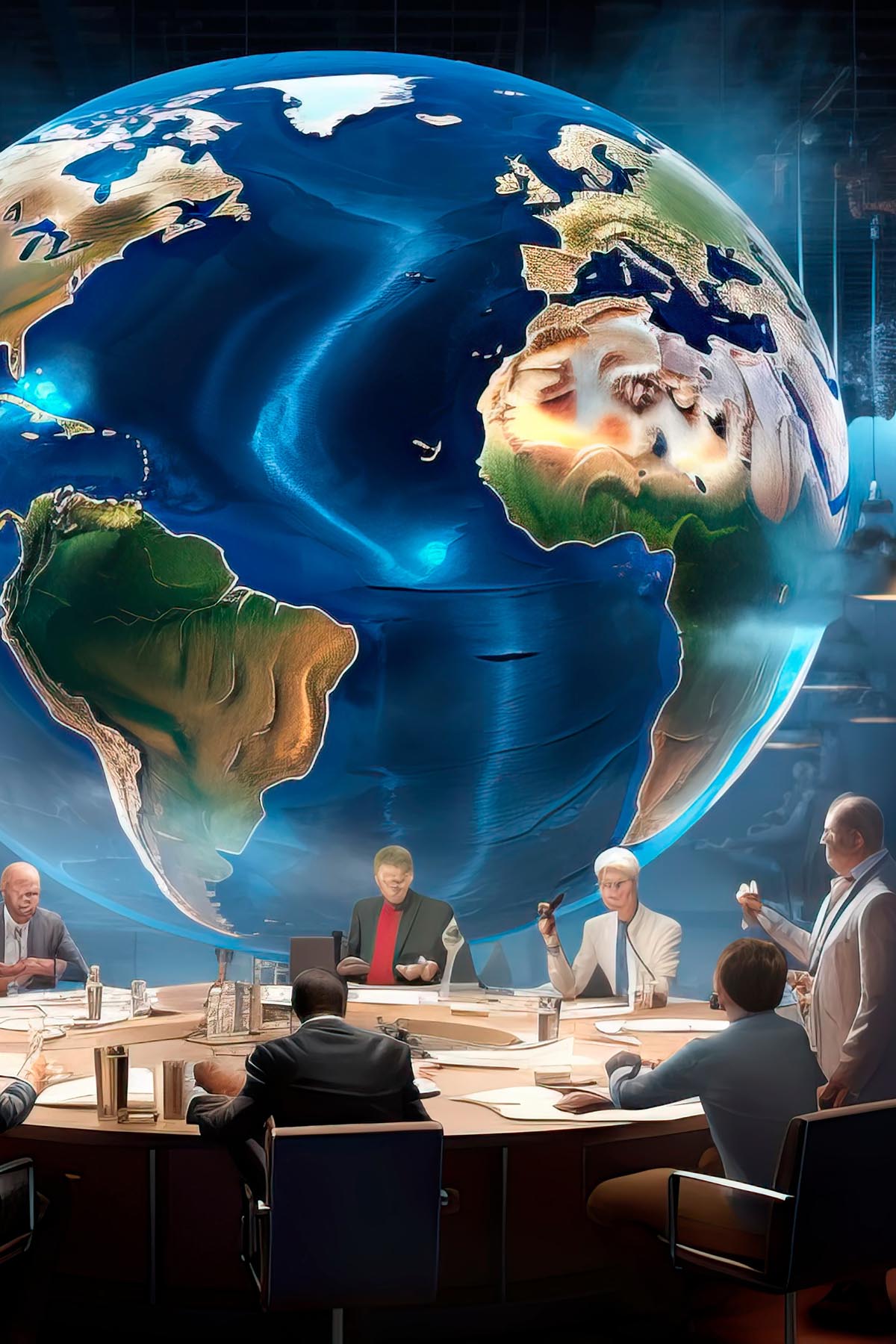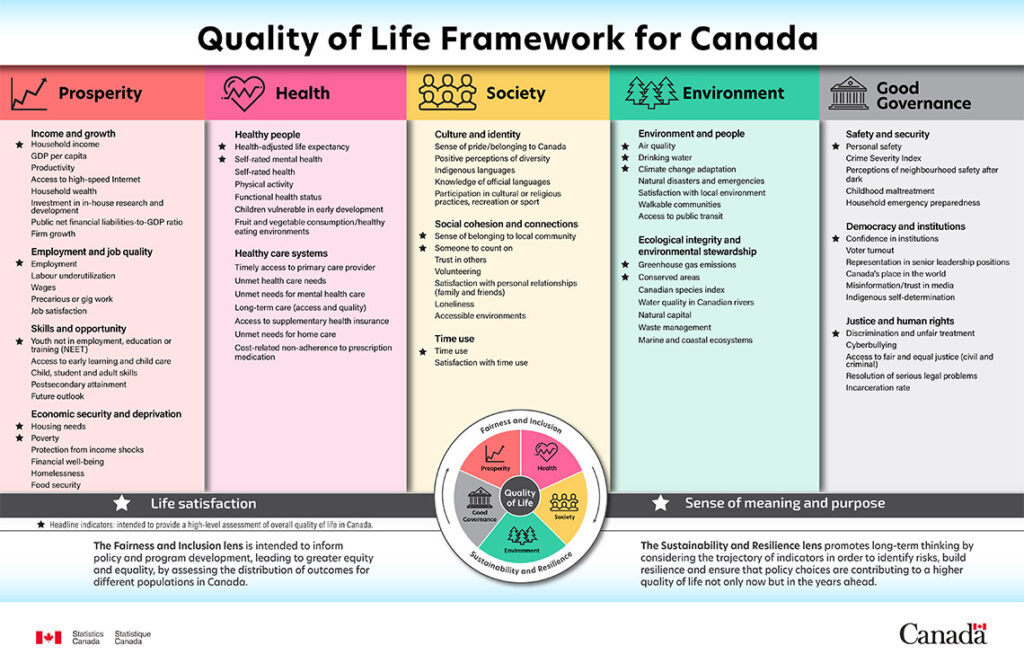A Patron for AI? – Wellbeing Indexes for Policymaking –Complexities of Climate Change

THE CATHOLIC COMMONS
A Patron for AI? – Wellbeing Indexes for Policymaking –Complexities of Climate Change
March 2024
In Good Conscience
In 1983, a mid-level Soviet officer saved millions of innocent people from a nuclear missile strike by overriding a computer-generated “launch” command. His action averted a Third World War, but ended his career. We pray in thanks for his sacrifice, and invite his intervention on robotic weapons.

An Unlikely Patron
In September 1983, a 44-year-old Soviet missile command officer was at his post, monitoring a newly-installed ballistic missile warning system in a secret bunker, in the very depths of the Cold War: only three weeks earlier, at the same time that it was stridently protesting the new “Star Wars” anti-missile system being deployed by the United States, the Soviet Union had unapologetically shot a straying Korean Airlines 747 out of the sky, killing its entire crew and all 246 of its passengers.
Just after midnight the new warning system began to light up, reporting multiple ballistic missile launches originating from the United States and advising the officer to initiate a retaliatory nuclear strike. After watching his warning lights, with both the system itself and other officers in the command post shouting at him for nearly five minutes to initiate a retaliatory launch – acting partly on a knowledge of the system itself, partly on an understanding of predicted patterns of nuclear war, and partly on a gut hunch – the officer, Lieutenant Colonel Stanislav Petrov, chose instead to report to his superiors that the system had malfunctioned.
Providentially, his superiors accepted his assessment. A six-month investigation, which included “intensive interrogation” of Colonel Petrov, determined that the system’s satellites had picked up reflections of the setting sun on the tops of clouds, and that the system’s analytical program had erroneously evaluated them as missile launch signatures.
Petrov reported that it was not an easy decision to make: “I thought the chances were 50-50 that the warnings were real,” he told Time Magazine after the Cold War had ended. “But I didn’t want to be the one responsible for starting a third world war.”
We can all be thankful that an officially atheist country produced a missile command officer who was not only calm and reflective under pressure, but cared strongly enough about right and humanity to make a monstrously difficult decision – a decision that came with a significant price for him.
Following his “intensive interrogation,” and apparently in order to deflect embarrassment from his superiors, Colonel Petrov was reassigned to less critical duties. He took early retirement, suffered a nervous breakdown, and lived thereafter a humble and relatively obscure life. We can all be grateful that God chose to put him in command of that bunker on that night, and to inspire his gut decision.
Aside from obvious implications for the sanctity of life and creation, about peace and the common good, the incident raises other points for reflection: what does the principle of subsidiarity have to say about the fact that the Soviet command structure left a single 44-year-old mid-level officer alone as a critical link in a command chain having potentially catastrophic responsibilities?
It also begs questions about the use of robots to make decisions concerning entire populations of human beings. It has recently been reported that several countries, including the United States and Israel, are using artificial intelligence (“AI”) software to control target selection and battlefield deployments, and to make firing decisions.
We will consider in future issues what the Church has to say about the wisdom of unleashing fully-automated killing machines with full, unsupervised authority to make life-or-death decisions about the slaughter of human beings, or indeed about shooting people at all.
In the meantime, let’s pause to pray for Lt. Col. Petrov, who is reported to have died in 2017. What might have happened if another, less balanced officer had been assigned to Petrov’s chair that morning? Would they have chosen a similar sacrifice?
A dogmatically atheist missile defense command seems an unlikely place to look for a patron saint for Artificial Intelligence. But let us not boast that we have God, and Mr Petrov had not. Christians have existed in Russia for many centuries, regardless of the philosophies of its rulers. Even if Mr Petrov did decline to believe in God, let us recall that God can raise up children to Abraham from stones (Matthew 3:9), and that Christ, who humbled himself, becoming obedient to death, even death on a cross, was greatly exalted by God, who bestowed on him the name that is above every name, so that:
At the name of Jesus every knee should bend, of those in heaven and on earth and under the earth, and every tongue confess that Jesus Christ is Lord, to the glory of God the Father.
Philippians 2: 3-11.
Sources:
- https://web.archive.org/web/20181218193954/https://www.washingtonpost.com/wp-srv/inatl/longterm/coldwar/soviet10.htm
- https://web.archive.org/web/20170920071427/http://time.com/4947492/stanislav-petrov-soviet-officer-nuclear-war/
- https://time.com/4947879/stanislav-petrov-russia-nuclear-war-obituary/
- https://media.defense.gov/2022/Mar/17/2002958406/-1/-1/1/SUMMARY-OF-THE-JOINT-ALL-DOMAIN-COMMAND-AND-CONTROL-STRATEGY.PDF
- https://www.npr.org/2023/12/14/1218643254/israel-is-using-an-ai-system-to-find-targets-in-gaza-experts-say-its-just-the-st
Of Common Interest
In evaluating new policies, multiple governments have begun to move away from exclusive reliance on economic considerations such as GDP. They’re turning instead toward more holistic “well-being” indicators. Now is the time for Catholics to have input into how these indicators are defined.
Measuring the Well-Being of a Nation
The purpose of any government is to create social conditions, including economic and legal systems, in which human beings can thrive – in Catholic terms, to promote the common good, defined as the sum of all conditions that will allow people, as both groups and individuals, to reach our true fulfillment more fully and more easily. In other words, our governments are supposed to make it possible for us to look for the truth, and when we’ve found it, to live in accordance with it.
It’s a large and complex responsibility in a world that never stops changing. It makes sense that governments would periodically want to step back and check on how they’re doing, to make sure they’re setting us up for success. But how do they do that?
For decades, the sole indicator used by many governments to measure the happiness and well-being of their people has been “gross domestic product”, or “GDP”: an annual estimate of a country’s total economic output (see for example https://data.oecd.org/gdp/gross-domestic-product-gdp.htm). As societies and economies have developed, however, academics, activists, and ordinary citizens have begun to question how well national material production capacity actually reflects the wellbeing of a people. Perhaps, for example, indicators of physical, spiritual, and emotional health, opportunities for social advancement through education, the state of local and regional environments, and the healthy growth of thought and understanding ought to be considered, in addition to our opportunities to make and consume things that may or may not have anything to do with the search for truth.
Political parties in several countries have begun to promote this idea, and in Europe the Organization for Economic Cooperation and Development (OECD) has begun applying its own wellness index to monitor social health in member countries (https://www.oecd.org/wise/). Several countries, including at least Scotland, New Zealand, Iceland, the United Kingdom, Wales, France, and Canada have begun to roll out indexes tailored for their own national cultures, based on the OECD effort.
In Canada, the federal government recently introduced a “Quality of Life Framework.” The rollout has been quiet, as if the government is concerned about getting too much feedback too fast. As introduced, the Canadian index includes five primary factors – prosperity, health, society, environment and good governance – each of them to be applied through “lenses” of fairness and inclusion, and sustainability and resilience, interpreted as indications of life satisfaction and sense of meaning and purpose. The Canadian government has invited the public to provide comments (https://www160.statcan.gc.ca/index-eng.htm) for use in defining specifics for application of the framework.

(Poster available at https://www160.statcan.gc.ca/infosheet-infofiche-eng.htm)
Points to Ponder
It seems clear that the use of holistic well-being indices offers vast improvement for policy development, as alternatives to bare production statistics. The key, obviously, lies in the definition of factors used in applying the indices.
The principles, values, and virtues of Catholic social doctrine offer a good starting point.
- How do the principles of the sanctity of life, the common good, subsidiarity, and solidarity, interpreted so as to promote the values of truth, freedom, justice, and charitable love and informed by the virtues of good stewardship, humility, and respect map into the frameworks proposed by Scotland, Canada, and other countries? (https://catholicconscience.org/catholiccivics/).
- Where a government has asked citizens for feedback to help define proposed indices, how should citizens respond? Where should they look for principles and values to guide them in crafting their responses? Should they respond as individuals, groups and organizations, or all three?
- Do Catholics have a duty to respond (https://catholicconscience.org/catholiccivics/; Duty to Participate)? If so, should we work from the principles, values, and virtues of Catholic social teaching?
Are you able to map your own proposals for factors affecting the quality life into the Canadian government’s framework? If so, do your views conform to Catholic social teaching?
- The Catechism of the Catholic Church explains that:
1925 The common good consists of three essential elements: respect for and promotion of the fundamental rights of the person; prosperity, or the development of the spiritual and temporal goods of society; the peace and security of the group and of its members.
1926 The dignity of the human person requires the pursuit of the common good. Everyone should be concerned to create and support institutions that improve the conditions of human life.
1927 It is the role of the state to defend and promote the common good of civil society. The common good of the whole human family calls for an organization of society on the international level.
Bearing in mind that the Church is intended to serve as a moral guide for society (https://catholicconscience.org/catholiccivics/; Social Institutions; The Church), how can or should charities and the institutional Church encourage governments to accept and adopt the principles of the Compendium from the parish, diocesan, or provincal level? Can lay Catholics help to inform responses made by the institutional Church?
Of Common Concern
After a year of burning forests and unprecedented temperatures, it appears that we are finally waking up to climate change. But simple, easy solutions are not going to work. The world’s environment is a complex system, and will require a broad and intelligent response – including consideration of the full impact of the purchases and choices we make.
The Complexities of Climate Change (and Product Life Cycles)
It has been widely reported that 2023 was the hottest year on record (for example, see https://climate.nasa.gov/). Moreover, many observers predict that so long as we continue adding “greenhouse gases” to the atmosphere things will continue to heat up, bringing increasingly severe storms and weather events, along with droughts, flooding, wild-fires, and the various dangers and health risks such events entail (for example, see: https://www.noaa.gov/news/us-had-its-warmest-winter-on-record).
While some voices continue to question both the existence and the causes of climate change (https://www.theguardian.com/us-news/2024/feb/14/americans-believe-climate-change-study), it appears that the overwhelming consensus among client scientists is that the greatest contributor to global warming is human activity. In his encyclical Laudato si’, Pope Francis called for acceptance of the effects of human activity on the environment:
A very solid scientific consensus indicates that we are presently witnessing a disturbing warming of the climatic system… Humanity is called to recognize the need for changes of lifestyle, production and consumption, in order to combat… at least the human causes which produce or aggravate it. It is true that there are other factors, yet a number of scientific studies indicate that most global warming in recent decades is due to the great concentration of greenhouse gases released mainly as a result of human activity.
– Laudato si’, 23
Most governments have accepted that climate change is driven by human activity, and have undertaken to do something about it. (See, for example, https://unfccc.int/process-and-meetings/the-paris-agreement and https://www.cfr.org/backgrounder/paris-global-climate-change-agreements).
CO2 explainer. (NASA)
The Complexities of Climate Change (and Product Life Cycles)
Yet some of the same governments report to us that despite decades of promises, we are not only not making progress yet, but continue to lose ground https://unfccc.int/process-and-meetings/the-paris-agreement.
As our civic leaders and businesses finally seem to be taking climate change more seriously, and to be talking about how we should address it, some observers have reminded us to be careful – that massive, sudden adoption of new behaviours to address problems risk the creation of new problems, leaving us worse off than we were when we started. The Massachusetts Institute of Technology’s Climate Portal, for example, recently looked at emissions caused by the manufacture and use of electric vehicles, including their batteries (https://climate.mit.edu/ask-mit/are-electric-vehicles-definitely-better-climate-gas-powered-cars). And while they found that EV autos can indeed reduce emissions over their anticipated average lifetimes, compared to gasoline-powered cars, they did not address the large additional problem of recycling such vehicles, including especially their enormous chemical batteries. To recycle, repackage, transport, install, and use batteries requires massive amounts of energy.
The point is, that in assessing new techniques and products, we can’t just look at their effect on the environment while they are being used – we have to consider the entire life cycle of the product, from mining and processing needed materials, to manufacturing and transport for sale, to recycling the product when it’s worn out. There are many hidden environmental costs to things we humans choose to do.
Another point to consider is the spreading use of deceptive “greenwashing” tactics used by some producers to convince purchasers that their products are more environmentally friendly than perhaps they really are. See, for example, https://www.ncronline.org/earthbeat/justice/news/experts-weigh-harmful-impacts-green-transition
What on Earth are we to do? How can we live responsible lives?
Church Teaching
Ours is not a simple world. It would seem that there exist no easy, comprehensive answers to climate change. Rather, we may be faced with the necessity of learning to talk and work with one another, seeking understandings so that we can build productive approaches and share the costs of climate change in equitable fashion, and perhaps reconsidering our use of resources for purely to make our lives more convenient, or for recreation.
If we accept that our behaviours, at either individual or cultural levels, or both, are driving adverse effects in the weather, the environment, and our lives – and the lives of others, far and near – what can or should we do about it? The Church teaches (https://catholicconscience.org/catholiccivics/; Seven Themes; Stewardship of Creation) that we must constantly consider how our actions either glorify or harm this wonderous gift God has entrusted to us, and that this question is multi-faceted and must not be over-simplified.
With a vocation to glorify all life which includes respect for the inviolability and integrity of life, humans find themselves in the presence of all God’s other creatures. We can and are obliged to put them at our own service and to enjoy them, but our dominion over the world requires the exercise of responsibility. It is not a freedom of arbitrary and selfish exploitation. All of creation has value and is “good” in the sight of God. This is a marvelous challenge to human intellect. (112, 113, Compendium of the Social Doctrine of the Church).
As Pope Francis has explained,
Living our vocation to be protectors of God’s handiwork is essential to a life of virtue:
it is not an optional or secondary aspect of our Christian experience.
– Laudato Si’
The good steward neither allows the resources entrusted to him to lie fallow or to fail to produce their proper fruit, nor does he waste or destroy them (Matthew 25:14-30). Rather, he uses them responsibly, for the Lord’s purposes, to realize their increase so that he may enjoy his livelihood and provide for the good of his family, his descendants, and his neighbors.
Humanity’s relationship with creation and the creatures of the earth “requires the exercise of responsibility, it is not a freedom of arbitrary and selfish exploitation.” – 115, Compendium of the Social Doctrine of the Church. Resources in nature are quantitatively scarce, which means that each individual economic subject, as well as each individual society, must necessarily come up with a plan for their utilization in the most rational way possible, following the logic dictated by the “principle of economizing.” – 346, Compendium of the Social Doctrine of the Church
Points to Ponder
Virtues: wisdom and prudence
Despite the “solid consensus” that climate change is true, and that we are now witnessing its effects, and that its primary cause is human activity, a significant portion of the global population continues to believe that any fluctuations we may now be witnessing are entirely natural, and not harmful to humans. In other words, it can fairly be said that doubt still exists in the collective human mind.
How are we, the Church, to approach problems when they are clouded with doubt? Sections 1787 of The Catechism explains that when confronted with difficult moral decisions, we should always earnestly seek what is right and good, attempting to discern the will of God. Section 1788 adds that we should act prudently, seeking the advice of competent people and the help of the Holy Spirit.
It seems that as a starting point, prudence would dictate that we each of us, as individuals and groups, should consider:
- Reducing our consumption, in all areas, as best we can
- Reusing things when can, rather than buying new things, until they can no longer used for any purposes
- Repairing things, if repairing them doesn’t cause more harm than recycling and replacing them
- Recycling things when we’re sure we’re done with them and can’t economically be repaired or used for other purposes. Sometimes effort is required to recycle objects properly, and almost always it involves environmental damage
- Replace things only when we have to, choosing new purchases carefully and ensuring that are efficiently recyclable
Happily, this plan fits well with a life of Christian asceticism.
Responsibility and due diligence: product life cycles and emissions
A part of greener living is to consider the full environmental costs and implications of products before we buy them. We have to consider everything: the effort required to acquire and transport them, packaging, manufacturing, use, and recycling. This can be tremendously difficult.
How to assess the full environmental costs of our purchases? Several resources have been developed to help us assess the “product life cycle” costs of products. They are still fairly new, and will doubtless be refined to include the environmental costs of our computers and communications networks, as time goes on. Information and examples can be found at:
Events
Voter Guides for 2024
Catholic guides to the following elections are in the works. We will get basic guides posted as soon as we can, and update them when possible as elections approach. Target posting dates are provided. If you don’t see a desired jurisdiction in the list, or have other suggestions, please us know: info@CatholicConscience.org.
| Election Date | Jurisdiction | Type | Notes |
| 2024 Oct 19 | British Columbia | Provincial | Target posting: July 2024 |
| 2024 Oct 21 | New Brunswick | Provincial | Target posting: July 2024 |
| 2024 Oct 28 | Saskatchewan | Provincial | Target posting: July 2024 |
| 2024 Nov 5 | United States | Federal | Target posting: April 2024 |
| 2025 January | UK | Federal | Target posting: November 2024 |
| 2025 Sept 27 | Australia | Federal | Target posting: December 2024 |
| 2025 Oct 14 | Newfoundland & Labr. | Provincial | Target posting: January 2025 |
| 2025 Oct 20 | Canada | Federal | Target posting: April 2024 |
| 2027 | Kenya | Presidential | Target posting: January 2025 |
| 2028 May 9 | Philippines | Presidential | Target posting: January 2025 |
| 2029 | South Africa | General | Target posting: January 2024 |
First Saturday Rosary
We have shifted our online group Rosary for Civic Leaders & Participation to first Saturdays at 9AM Toronto/Montreal/US East Coast (UTC-5). Please join us if you can. We apologize for our several changes of schedule; we are trying to accommodate as many people as we can. https://CatholicConscience.org/programs/Rosary/
Prayer

To Our Lady of All Nations
Between 1945 and 1959, during a time of troubled healing and great political unrest following the catastrophic conflict of the Second World War – which was finally ended only with the tragic use of nuclear weapons, Ms Ida Peerderman of Amsterdam reported receiving a series of messages from the Blessed Virgin Mary. These messages concerned prayer for peace and Mary’s role as the Lady of All Nations. While Ms Peerderman’s reports remain controversial, the prayer associated with the apparitions seems timely and appropriate; and the title Lady of All Nations seems consistent with the Blessed Mother’s acknowledged role as Queen of Heaven.
It’s a lovely prayer:
Lord Jesus Christ, Son of the Father,
send now Your Holy Spirit over the earth.
Let your Holy Spirit live in the hearts
of all Nations, that we may be preserved
from degeneration, disaster and war.
May the Blessed Virgin Mary, Lady of All
Nations, be our Advocate.Amen

Donate

2024 Programming and Funding Goals
Thanks to you, we’re growing. Our formation materials and election templates are now consulted in more than 120 countries. We are trying to grow responsibly, so that we maintain balance and strict non-partisanship.
Here’s what we have in the works for 2024/2025
Discernment & Elections (Estimated Programming Budget $47,500.00)
Much of our work is directed toward specific elections. People are hungry for balanced, non-partisan information on the full range of social issues. We’re trying to keep up.
- Election Guides: Comprehensive analysis of party / candidate positions, with direct comparison to each other and to Catholic Social Teaching, and with Points to Ponder for promoting reflection from the Catholic point of view. We are preparing guides for 2024 for US Presidential Election, Canadian Federal (2025) and Provincial Elections, UK Federal Elections, and other State / Provincial / Municipal elections.
- Discernment Materials: Online Rosary campaigns and reflections for group and solo prayer.
- Parish Leader Workshops: Tips for getting out the vote by encouraging parishioners to organize candidates meetings / townhall meetings, helping eligible voters in registering to vote, and assisting those who need assistance in going to the polling station.
Deeper Civic Formation (Estimated Programing Budget $38,700.00)
A gratifying number of people are interested in learning more about Catholic Social Teaching, in particular its application in the civic and political contexts. We were delighted when we discovered how many high school and university classes, as well as home schools and private study groups – not to mention concerned individuals – are using our materials to understand how civics and politics can work for our true good. We want to expand the materials, and make them better.
- Newsletter: The Catholic Commons. Current events and commentary promoting reflection from the Catholic point of view – In Good Conscience, Of Common Interest, Of Common Concern
- Formational webinars and materials: The Catholic duty to participate in civic life, formation for politicians, candidates and civic leaders, and for campaign managers & staff.
- Catholic Civics: Resources for schools and teachers: lesson plans, instructional texts and videos.
Anything you can share will help not only you, but students, teachers, and maybe voters who don’t have enough to share. Thanks for whatever you can do, including prayer.
